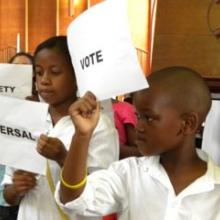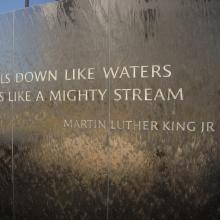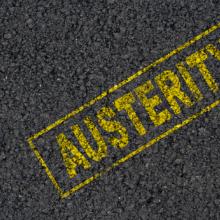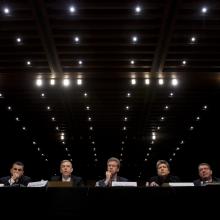Common good
As we celebrate our nation’s independence this week, it’s good that we also celebrate our interdependence. Everything that we do, everything that we have, all that we are bears the fingerprints of countless others from around the world who have brought us to this moment and sustain us in it.
We tend to overlook this reality. We like to think of ourselves as independent. We dread those times when we feel dependent upon others — when we’re sick or struggling and need some sort of assistance. We’d rather do it ourselves and feel independent, even though we‘re really not.
Conversations in Transition is a veritable graduate course in what South Africans call ubuntu, or good neighborliness.
Charles Villa-Vicencio and Mills Soko present 23 narratives of both well-known and unsung heroes of the anti-apartheid struggle. These narratives are filled with instructive words of wisdom for seekers of peace with justice in countries emerging from post-tyranny chaos and in long-established democracies alike. Historians and activists will find hope in the stories of South Africa’s courageous, diverse citizens, as well as prophetic insights and warnings as the subjects address post-apartheid violence and oppression in a country still on the edge.
My own experiences lead me to an unqualified endorsement of this invaluable compendium. Over several decades I have pondered repeatedly two particular conversations, one with a Jew in Israel and the other with a Muslim from Cape Town.
An effort was made to introduce the Truth and Reconciliation Commission (TRC) process into the Israel-Palestine conflict. At the end of an evening with South African officials and members of the Israeli and Palestinian communities, the director of a Jewish study center in West Jerusalem, Benjamin Pogrund, shared a revealing comment. He said, “TRC will never work here because Israelis do not have the theological and philosophical understanding of forgiveness and reconciliation that Muslims, Christians, and Jews shared in South Africa in order to bring unity and liberation without major conflict.”
FOR ANYONE who’s sick of explaining that not all evangelicals are flag-waving, Quran-burning, gay-hating, science-skeptic, anti-abortion ralliers, The Evangelicals You Don’t Know: Introducing the Next Generation of Christians provides a boost of encouragement. Written by frequent USA Todaycontributor Tom Krattenmaker, this who’s who of “new-paradigm evangelicals” explains how a growing movement of Jesus-followers are “pulling American evangelicalism out of its late 20th-century rut and turning it into the jaw-dropping, life-changing, world-altering force they believe it ought to be.”
Unlike their predecessors, these new evangelicals are characterized by a willingness to collaborate with members of other religions and no religion for the common good, warm acceptance of LGBTQ folks, a rejection of the dualistic pro-life vs. pro-choice debate, and a desire to participate in mainstream culture rather than wage war against it. All this “while lessening their devotion to Jesus by not a single jot or tittle.”
Admittedly, the book’s cover photo doesn’t quite do justice to Krattenmaker’s observations. Featuring young worshipers in a dark sanctuary with hands uplifted and eyes closed, each apparently lost in a private moment of four-chord progression praise, the cover looks more like a Hillsong worship concert circa 1998 than cutting-edge 2013 evangelicals. (If you’re unfamiliar with the four-chord progression, Google “how to write a worship song in five minutes or less.” You’re welcome.)
THE APRIL 24 collapse of a garment factory near Dhaka, Bangladesh, killed more than 1,125 people. That tragedy followed a fire that killed 112 last November at a factory making goods for companies including Walmart. According to the International Labor Rights Forum, at least 1,800 garment workers in Bangladesh have died in fires or other factory disasters since 2005. The collapse near Dhaka is the largest disaster in that time and the one that has gotten global attention.
As a Dominican Catholic sister and member of Catholic Scholars for Worker Justice, I approach reflection on such a disaster from the foundation of Catholic social teaching. Each of the social principles below relates to the situation in Bangladesh and challenges us to reflect on our own regard for those who provide our clothing.
- Life and dignity of the human person. Story after story of the people who work in the garment industry shows the lack of respect for workers. Long hours, few to no breaks, prevalent verbal, physical, and sexual abuse, and now the collapse of a factory—do we need any more proof that human life is held in so little regard? Many years ago, Cardinal Joseph Bernardin called for an understanding of “respect life” as inclusive of human life “from womb to tomb.” Our upholding of life must include working toward changing factory conditions so that a debacle such as Dhaka never happens again.
On Memorial Day weekend, our family of four participated in six baseball games! Having just returned from a six-week book tour, it was such a refreshing change from discussing our nation’s politics, which is all the media wants to talk about and is more and more well, disgusting.
A sign outside our home’s front door says, “This family has been interrupted by the baseball season.” Both of our boys play, I coach, and my wife Joy Carroll is the Little League Baseball Commissioner — cool job for a Church of England priest!
On Saturday, we played in the Northwest Little League All Star game, which I got to coach with my son Jack on one of the teams. Our team came out on top, and Joy made 100 hotdogs for a celebration after the game. Our last victory cheer was “1, 2, 3, HOTDOGS!” The picture here shows the enthusiasm of the 9- and 10-year-olds I get to coach every single week. It’s what keeps me grounded in real life — amid the politics of this dysfunctional capital city — and it’s what gives me joy. Coaching baseball has also kept me deeply connected to my two sons, as I write about in my new book.
We had just helped save an immigration reform bill in the Senate Judiciary Committee — advocating for 11 million undocumented people who Jesus calls the “strangers” against the special interest politics of both left and right — when I entered the field for our Little League Tigers game on Friday night. It was just what I needed.
Here is a great baseball story that explains why I love Little League Baseball.
Twenty-five religious leaders gathered to commit themselves to civil discourse. The meeting brought together conservative and liberal leaders. They agreed to "move politicians, congregants and Americans in general to understand that mean-spirited debate makes it all the harder to solve the nation’s problems." The Washington Post reports:
“You need some voice to say,’OK, we get that it can win elections, but maybe that’s not the best course of action.’ Typically, we think of religious leaders as voices of conscience, calling people to a better way. So therein is the hope,” said Ed Stetzer, vice president of research and ministry development at LifeWay Christian Resources.
Read more here.
America is at a crossroads: We live in a society that promotes working for our own ends, but if we are to survive and flourish it is time to start sacrificing for the common good by working together.
In early April, advocates for public education traveled to Washington D.C. for Occupy the Department of Education (Occupy the DOE). Students, parents, educators, and community members came together to protest a current system that is designed to segregate our society, while demanding a public education system that devotes itself to the common good through sacrifice of self for the love of the whole.
As Americans, we live in a culture that is hyper-individuated, fragmented, and dehumanizing as it pushes a mantra of success based on material accumulation and power. Being in community with others is the countercultural answer to this. Doing so with others unlike ourselves is an important part of this. At the end of the day, above the polarization and partisanship, there is much we can do to promote the common good together. As Maddie put it at a meeting that brought Christians of opposing social interpretations together, "We may never agree on some issues, but that is not why we're here; we're good people, you're good people, let's do good together."
Freedom has always been important to Americans, but a short-sighted definition of freedom has played havoc with the common good recently. Communities, essential to our survival and well-being, are suffering.
All communities have rules. In my faith community, there are two great commandments: Love God and neighbor (even enemies). It’s a difficult balance, but when I manage it, I experience freedom from fear, a major reason that I joined the church in the first place. Those two basic rules have held up well, especially as my neighborhood has expanded to include the whole world.
DREAMS CAN serve a powerful purpose. Jacob dreamed a ladder and was renamed Israel. Joseph dreamed the sun and moon and stars and was sold into slavery. The magi dreamed a warning and returned home by way of another road.
Years ago I had a dream. I sat, a child, on a dirt floor. Around me paced a horse, saddled, ready. In front stood an immense door, cathedral-tall and brooding. And though open, the space within was dark. I was holding a light. And in the dream, I knew we were to bring light into that darkness. And the darkness—the darkness was the church.
In Truth Speaks to Power: The Countercultural Nature of Scripture, Walter Brueggemann, professor emeritus of Old Testament at Columbia Theological Seminary, bears light to the exegetical (seminary lingo for interpretive) work and examination of the interplay between truth and power found in both familiar and less familiar narratives of Old Testament scripture. Rigorous in content, the read is nevertheless accessible to scholar and novice alike.
Brueggemann's concern with the interplay of truth and power rests on the observation that far too often truth, even biblical truth, is found colluding with and legitimizing the self-serving and self-preserving agenda of totalistic and monopolizing authorities. To use biblical imagery, truth sides with the Pharaohs and the Solomons of the world and not with those on its margins and periphery.
The first two chapters draw on Brueggemann's impressive scholarship of Old Testament text and narrative to paint a disconcerting picture where not only are the bad guys truly bad, the good guys aren't any better. Take Joseph, the Technicolor-dreamer-slave become all-powerful-vizier (think prime minister) of Egypt. It is Joseph's land acquisition scheme, strategically implemented amid drought and famine, that results in Pharaoh controlling most of Egypt's wealth. It is Joseph who creates a permanent peasant underclass—the very class that will cry out for liberation from the injustice of having to bake bricks with no straw. And Solomon—well, you know something's gone terribly amiss when your empire accumulates "six hundred sixty-six talents of gold" (1 Kings 10:14) each year. If you don't see the editorial subtext, write it out numerically. Ouch!
IN THE PAST 20 years, the world has witnessed the death of social contracts. We have seen a significant breakdown in trust between citizens, their economies, and their governments. In our own country, we can point to years of data painting a bleak picture of the confidence Americans have in any of our traditional institutions.
Former assumptions and shared notions about fairness, agreements, reciprocity, social values, and expected futures have all but disappeared. The collapse of financial structures and the economic crisis that followed not only caused instability, insecurity, and human pain; they have also produced a growing doubt and basic distrust in the way the system functions and how decisions are made.
This year, at the World Economic Forum in Davos, Switzerland, we looked to the future and asked, "what now?" At a key session—"The Moral Economy: From Social Contract to Social Covenant"—a document was announced that kicks off a year-long global conversation about a new "social covenant" between citizens, governments, and businesses.
It is really a call for worldwide discussion about what values are needed to address the many difficult challenges the world is now facing. Inequality, austerity, retrenchment, maldistribution, conflicts over resources, and extreme poverty all raise questions about our values.
Having achieved our freedom we can fall into the trap of washing our hands of difficulties that others face. We would be less human if we do so…we know too well that our freedom is incomplete without the freedom of the Palestinians.
- President Nelson Mandela- December 1997
There is visceral identification by South Africans with the suffering of the Palestinians.
Newspapers and speakers at South Africa Human Rights Day/U.N. International Day for the Elimination of Racial Discrimination focused on the liberation of the oppressed and the importance of a mobilized civil society to stand with the marginalized. The events commemorate the nonviolent protest against the racial passbooks, March 21, 1960. The day ended tragically with the Sharpeville massacre, which left 69 people dead and 180 injured. Nelson Mandela burned his discriminatory passbook a week later and the long march for freedom and dignity began in earnest. Even when it is still a journey in progress of real equality and democracy for all, there is an intentionality expressed best by Mandela.
The commons was the name for the public space shared by all in New England towns. It is the root of commonwealth, a nice term for an entire civic entity, like a state, in which every citizen is viewed as a stake-holder. Its values are the opposite of those decried in the lament “private wealth and public squalor.” The commons are the opposite of gated communities.
Today, there are two crises of the commons — one on the right and one on the left. One is indifference to the commons, even starving the commons. This means the demise of “social capital” (the sum total of all social networks and human investments in a community or polity) and civic values shared by all, and their surrender to utilitarian individualism and the dominance of the market. The other is the argument over what discourse style is appropriate to the commons — what language should be spoken and what subjects allowed in public life. Hint: lucid rationality is in, religion is out.
In January 2011, members of Christian Churches Together in the U.S.A. met in Birmingham, Ala., to examine issues of domestic poverty and racism through the lens of the civil rights movement and by reading together Martin Luther King Jr.'s "Letter from Birmingham Jail." As they gathered in the 16th Street Baptist Church under the beautiful Wales Window portraying the black Christ, which replaced the window blown out when the church was bombed in 1963, these contemporary church leaders, representing the broadest Christian fellowship in the country—36 national communions and seven national organizations, including Sojourners—realized that apparently no clergy had ever issued a response to King's famous letter, even though it was specifically addressed to "fellow clergymen [sic]." In 2013, to mark the 50th anniversary of King's letter, Christian Churches Together released its thoughtful response, which we excerpt below. —The Editors
WE CONFESS. As leaders of churches claimed by more than 100 million Americans; as Catholics, evangelicals, Pentecostals, Orthodox, Historic Protestants, and members of Historic Black denominations; as people of many races and cultures: We call ourselves, our institutions, and our members to repentance. We make this confession before God and offer it to all who have endured racism and injustice both within the church and in society.
As church leaders, we confess we have tended to emphasize our responsibility to obey the law while neglecting our equal moral obligation to change laws that are unjust in their substance or application. All too often, the political involvement of Christians has been guided by the pursuit of personal or group advantage rather than a biblically grounded moral compass. We confess it is too easy for those of us who are privileged to counsel others simply to "wait"—or to pass judgment that they deserve no better than what they already have.
We confess that we are slow to listen and give legitimacy to those whose experience of race relations and social privilege in America is different than our own. We keep the "other" at arm's length to avoid hearing the call to sacrifice on their behalf. Our reluctance to embrace our "inescapable network of mutuality" underscores Dr. King's observation that privileged groups seldom give up their advantages voluntarily. For example, it is difficult to persuade most suburban Christians to demand that they strive for the same quality of education in our cities that they take for granted in their own schools. To the extent that we do not listen in love, our influence in society is limited to "a weak, ineffectual voice with an uncertain sound."
OUR LIFE TOGETHER can be better. Ours is a shallow and selfish age, and we are in need of conversion—from looking out just for ourselves to also looking out for one another. It's time to hear and heed a call to a different way of life, to reclaim a very old idea called the common good. Jesus issued that call and announced the kingdom of God—a new order of living in sharp contrast to all the political and religious kingdoms of the world. That better way of life was meant to benefit not only his followers but everybody else too. And that is the point of it.
Christianity is not a religion that gives some people a ticket to heaven and makes them judgmental of all others. Rather, it's a call to a relationship that changes all our other relationships. Jesus told us a new relationship with God also brings us into a new relationship with our neighbor, especially with the most vulnerable of this world, and even with our enemies. But we don't always hear that from the churches. This call to love our neighbor is the foundation for reestablishing and reclaiming the common good, which has fallen into cultural and political—and even religious—neglect.
Judaism, of course, agrees that our relationship with God is supposed to change all our other relationships, and Jesus' recitation of the law's great commandments to love God and your neighbor flows right out of the books of Deuteronomy and Leviticus (see Deuteronomy 6:5; Leviticus 19:18). Islam also connects the love of Allah with love and responsibility to our neighbors. In fact, virtually all the world's major religions say that you cannot separate your love for God from your love for your neighbor, your brothers and sisters. Even the nonreligious will affirm the idea of "the Golden Rule": "Do to others as you would have them do to you" (Luke 6:31).
AS THE U.S. Congress and the president repeatedly battle over the debt ceiling and contemplate cuts to Social Security and Medicare, austerity has begun to sound like common sense: "Families tighten their belts during hard times, and so must government."
However, "common sense" in our media age is carefully manufactured, and its underlying analogy doesn't always hold up to scrutiny. "Living within our means," for most families, includes debt financing for housing, cars, and college. Families having a hard time paying their bills may indeed tighten their belts—but they seek more income first, and cut care for children and the sick last. In contrast, federal budget austerity arguments always focus on spending, ignoring the revenue crisis born of decades of tax cuts.
Christians have a more profound reason to question "austerity measures": They conflict with our faith in God's abundance. In parable after parable—the prodigal son, the unforgiving debtor, Lazarus and the rich man—Jesus challenges us to emulate God's generosity. It is the theme of that most eucharistic miracle, the loaves and fishes. How to live in the light of God's abundance is never an easy question, but we must be open to its logic in every area of human existence, including our personal lives, our economy, and our government.
There is, needless to say, a deep contrast between Christian notions of abundance, rooted in God's boundless creative gift, and the modern field of economics, which bases itself on the principle that commodities are scarce. Yet there are also resonances between abundance and modern macroeconomics (the study of whole economies) as it developed in the New Deal period and the first three decades after World War II—especially in the great postwar era of shared prosperity, which saw an explosive expansion of the middle class.
During that period, everyone gave to the national common good, and everyone received—not just through strongly redistributive taxation, but through shared, unprecedented economic growth. And it wasn't simply the "invisible hand" of the marketplace that guided growth: The market was fostered by government's investment in infrastructure and education.
I RECENTLY FINISHED a new book, which we launch on April 1, the day after Easter. The beginning of the Easter season is a liturgically appropriate moment for the introduction of a hopeful book in what many feel is a hopeless time.
I wanted to tell you, our faithful magazine readers, why I wrote this book, and why I called it On God's Side: What Religion Forgets and Politics Hasn't Learned About Serving the Common Good.
This is not just another book for me. I wrote it during a three-month sabbatical that started in a monastery overlooking the Pacific Ocean. Every day started before sunrise with prayers, walks, yoga, and exercise, followed by writing the rest of the day. My other discipline was not to write or comment publicly on the news. I watched the nation's political discourse each night after a day of writing and found it more depressing than ever. It was an election year.
The resulting book is not about politics in the narrow sense, but about how to engage our personal and public lives with an ancient but timely idea and practice—the common good—that has long and deep historical roots across many religious faiths and secular notions of democracy. I sought to explore the biblical and theological roots of the idea, and then apply it to the most basic questions of economic trust, the role of government, civility, renewing democracy, globalization, conflict resolution in a violent world, and, of course, what our faith can contribute to the common good with the world as our parish. Most compelling, I found Jesus' call to love our neighbors to be the gospel foundation for serving the common good, and the excerpt in this issue, "A Gospel for the Common Good" (page 16), makes the case for that.
For Christians, the book explores a fundamental question: Why did Jesus come, and what do the gospel and the mission of the church really entail? The book's message is that when people of faith actually say and do the things their faith stands for, two things happen: at first other people are surprised, and then they are attracted. It examines both inspirations and practices for how we can respond to the growing hunger for a better life together and find common ground for the common good, especially in relation to those who are the most vulnerable.
 A few weeks back at the Justice Conference we had the chance to sit down with Jeremy Courtney, cofounder of the Preemptive Love Coalition, to tell the story of his amazing work in Iraq providing heart surgery for children.
A few weeks back at the Justice Conference we had the chance to sit down with Jeremy Courtney, cofounder of the Preemptive Love Coalition, to tell the story of his amazing work in Iraq providing heart surgery for children.
Special thanks to Matthew Willingham and everyone at the Preemptive Love Coalition for providing us with footage from Iraq to tell their story.
The video below is a first in our new series Sojo Stories, where we sit down with individuals to hear their stories about using their talents for the common good.
Politics at its best serves the common good — far above any one interest or political party. And right now in Washington, we see that playing out as we continue to reach accord on immigration reform. But when it comes to our budget debate, partisan ideology and special interests are winning out over the common good.
The ever-looming “sequester” that was never supposed to happen goes into effect tomorrow. Billions of dollars will be cut from domestic and military spending without any plan or strategy; jobs will be lost and people will suffer. Public frustration is growing with our elected officials, while they continue to argue over the role of government instead of governing responsibly. The press discusses who wins and loses in the polls, but it is clear that it is the common good that is losing.
On the other hand, immigration reform is being discussed, at the same time with the same political players, in a very reasonable and hopeful way. On that important policy change, bipartisan work is going forward to shape legislation that could pass both houses of Congress.
The sequester battle is a good but tragic example of how the idea of the common good is failing in American politics. By contrast, the growing bipartisan support for comprehensive immigration reform is an alternative example of how a moral issue can rise about our ideologically driven politics.
The faith community has stepped into both issues with a call for political leaders to serve the common good. On immigration, political leaders are listening to the faith leaders; on the debates about our nation’s fiscal soul, political leaders need to listen better.













